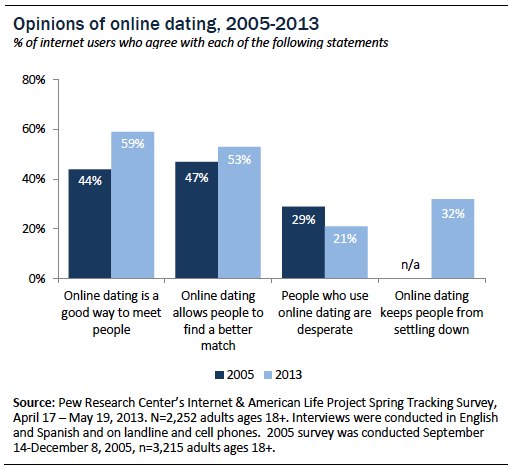New research suggests that one in three Americans now meet their spouses online, and that those marriages are more satisfying and less likely to end in divorce than those that begin in traditional, offline venues.
Couples who met online three times more likely to divorce
The study, published in the journal Proceedings of the National Academy of Sciences and funded by eHarmony , examined the marital status and satisfaction of 19, people who tied the knot between and Of the nearly 20, respondents, 35 percent met their spouses online. Within that group, nearly half met through online dating sites, "whose number of users has increased dramatically just over the past decade," according to the research.

Others reported meeting their spouses through social media, chat rooms, and e-mail, among other online venues. And while the research found that nearly 8 percent of marriages initiated offline ended in breakups, couples who met online reported lower rates of separation and divorce -- 6 percent.
MORE IN LIFE
The authors point to previous research that indicates that people may be more honest when interacting online to explain the findings. But if the researchers add random links between people from different ethnic groups, the level of interracial marriage changes dramatically. And there is another surprising effect. The team measure the strength of marriages by measuring the average distance between partners before and after the introduction of online dating.
MORE IN Divorce
Next, the researchers compare the results of their models to the observed rates of interracial marriage in the U. But the rate of increase changed at about the time that online dating become popular. The increase became steeper in the s, when online dating became even more popular.
Then, in , the proportion of interracial marriages jumped again. But it is consistent with the hypothesis that it does.
Does the Rise of Online Dating Have Anything to Do with Falling Divorce Rates?
Meanwhile, research into the strength of marriage has found some evidence that married couples who meet online have lower rates of marital breakup than those who meet traditionally. That has the potential to significantly benefit society. Of course, there are other factors that could contribute to the increase in interracial marriage. One is that the trend is the result of a reduction in the percentage of Americans who are white. If marriages were random, this should increase the number of interracial marriages, but not by the observed amount. That leaves online dating as the main driver of this change.
Are dating apps killing long-term relationships?
These changes are set to continue, and to benefit society as result. The Strength of Absent Ties: Social Integration via Online Dating. Mainstream online legal services are getting serious about using crypto to automate bits of what they do—and lower the bar to entry for us all. Many thought the internet would bring democracy to China.
- Quick picks.
- Tired romance.
- Couples who met online three times more likely to divorce - Telegraph;
Instead it empowered rampant government oppression, and now the censors are turning their attention to the rest of the world. Everything included in Insider Basic, plus the digital magazine, extensive archive, ad-free web experience, and discounts to partner offerings and MIT Technology Review events. Unlimited online access including all articles, multimedia, and more. The Download newsletter with top tech stories delivered daily to your inbox. Technology Review PDF magazine archive, including articles, images, and covers dating back to Revert to standard pricing.
Hello, We noticed you're browsing in private or incognito mode. Subscribe now for unlimited access to online articles.
Why we made this change Visitors are allowed 3 free articles per month without a subscription , and private browsing prevents us from counting how many stories you've read. Now evidence is emerging that this change is influencing levels of interracial marriage and even the stability of marriage itself. When Chinese hackers declared war on the rest of us. A neural network can learn to organize the world it sees into concepts—just like we do.
Technology, Work, and Urban Ecosystems: How Should Cities and Regions Respond? The Next Generation of 3-D Printing Transforming the Future of Retail The Future of Education Blockchain smart contracts are here to help.